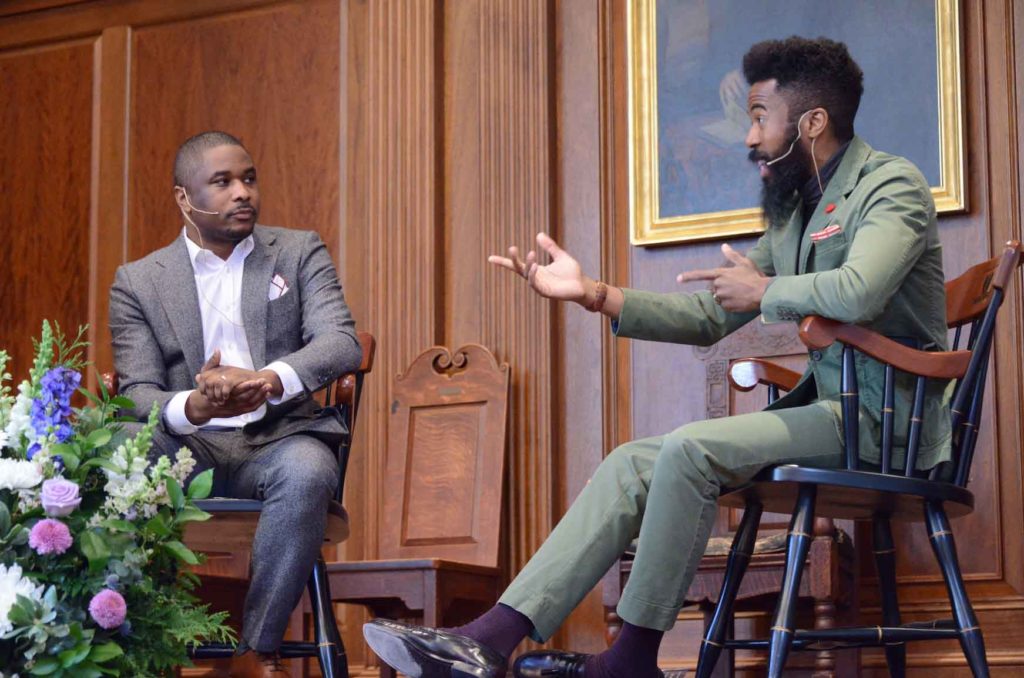Dr. Terry and Dr. Bennett Discuss MLK’s Powerful Philosophy of Love
We were honored to have with us on January 17—in celebration of Dr. Martin Luther King Jr.’s life and legacy—Dr. Brandon Terry and Dr. Joshua Bennett, who illuminated for us the breadth, depth, and power of MLK’s philosophy of love and non-violence as a means of bringing about meaningful action and change.
The annual MLK Commemoration Hall began with readings of Micah 6 by Luke Wilkinson (I) and excerpts from MLK’s “Letter From a Birmingham Jail” by Tyler Duarte (I), along with the singing of Wake Now My Senses and Lift Ev’ry Voice and Sing.
“Today, we gather to commemorate the life and work of Dr. Martin Luther King Jr.” began Headmaster Brennan. “We pause to recognize the contributions of this remarkable man and to consider anew the principles of justice, equality, and brotherhood—principles he pursued ardently and about which he spoke eloquently. While the United States today is blessedly different from the United States of Dr. King’s lifetime, racism and bigotry persist, and there continue to be opportunities for all of us to stand up for the values that Dr. King espoused. The prejudices and hatred that Dr. King worked so hard to eradicate remain in too many heads and hearts, even as laws and social policy have been advanced that protect and affirm the rights of all Americans. In these recent years, many headlines have focused on high profile cases involving race, violence, discrimination, activism and, thankfully in many cases, hope.”
“While Dr. King as a preacher believed in the power of the spoken word as a way to change people’s minds and hearts, he also knew that significant change could only come about through action, civil disobedience, changing institutions, and reaching out to many different kinds of people. He knew the importance of acting on principle when words could only begin to tell the tale. Given the divisiveness and prejudice that openly persist in our country, our vigilance, activism, and principles are consequential; we still have work to do if we want to achieve the social justice envisioned so many years ago by Dr. King. This work is the responsibility of every one of us, as Dr. King urged: ‘In the end, we will remember not the words of our enemies, but the silence of our friends.’”
“This past weekend, Boston focused again on Dr. King thanks to the dedication on Boston Common of a remarkable new sculpture called “The Embrace.” Evocative of Dr. King and his wife, Coretta Scott King, who met here in Boston while she was a student at the New England Conservatory, and he a grad student at BU, it captures not just their affection for each other but the broader aspiration for all people to warmly engage with each other and the broader goals of fairness, justice, and love. We, all of us, are the beneficiaries of Dr. King’s hopes and dreams, and now we must be their champions.”
In Hall, Dr. Terry delivered a clear and powerful master class on Dr. King as a philosopher, rather than as simply a political activist, speaker, or writer—the contexts in which we more typically understand Dr. King and his work. Dr. Terry went into great detail about the driving forces behind Dr. King’s philosophy of love and non-violence—a philosophy that has been criticized at times, both in King’s own time and sometimes still today. Dr. Terry talked at length about the Greek word “agape”—the type of love that is gracious and unmerited, which ascends beyond “eros” (romantic or erotic love) and even beyond “philia,” or brotherly love. He explained that Dr. King felt strongly that true change—true justice—in our society would not come about only through the enforceable (laws and policies), but rather through the unenforceable (kindness, generosity, and love).
Dr. Terry is the John L. Loeb Associate Professor of the Social Sciences at Harvard University and co-director of the Institute on Policing, Incarceration, and Public Safety at the Hutchins Center for African and African American Research. He is one of the country’s leading scholars on Dr. Martin Luther King Jr. and his legacy. He is co-editor of the book To Shape a New World: Essays on the Political Philosophy of Martin Luther King, Jr. and editor of Fifty Years Since MLK. His published work has been included in dozens of esteemed publications, from The New York Review of Books to Best American Essays. Dr. Terry also played a key role in the development and installation of the sculpture “The Embrace” unveiled recently on Boston Common, honoring the love and work of both Dr. King and Coretta Scott King.
After Dr. Terry’s remarks, he was joined on stage by his friend and our year’s Smith Scholar in Residence, Dr. Joshua Bennett. They together spent time in conversation about Dr. King’s philosophy of love; about Dr. Terry’s childhood in Baltimore and how he came to be a scholar of Dr. King; and about what justice can and should look like, and ideas on how to achieve it.
Dr. Bennett is a professor of English and Creative Writing at Dartmouth College. He is the author of four books of poetry and literary criticism: The Sobbing School—which was a National Poetry Series selection and a finalist for an NAACP Image Award; Being Property Once Myself; Owed; and his most recent book, published in September, The Study of Human Life. Dr. Bennett has recited his original works at venues such as the Sundance Film Festival, the NAACP Image Awards, and President Obama’s Evening of Poetry and Music at the White House. After Hall, Dr. Bennett spent time in English classes working with students on reading, writing, and appreciating poetry.

